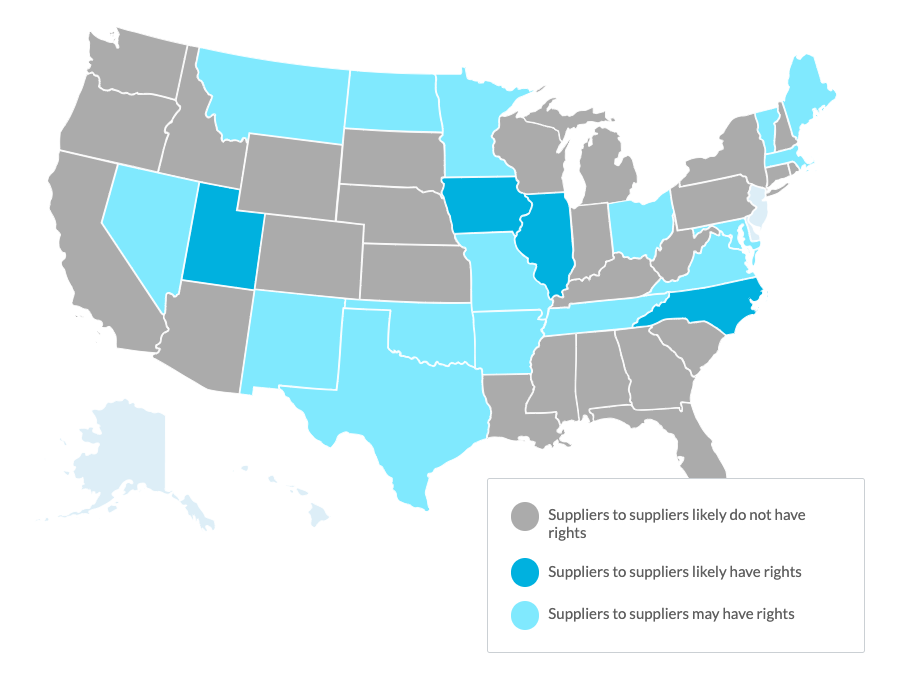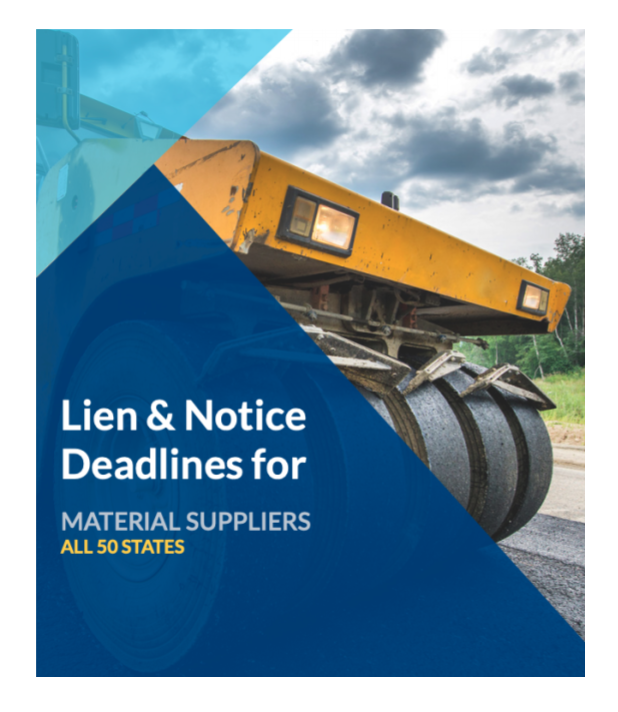

Material suppliers, often called materialmen, are usually granted lien rights on construction projects for which they provide building materials. These liens are often called materialmen’s liens. So what exactly is a materialman’s lien? And how is it different from a mechanics lien?
It takes a lot of people to make a construction project happen: architects, engineers, contractors, subcontractors, suppliers, and more. According to construction law, each of the parties has a legal right to get paid for their work. In all states, anyone who contribute permanent improvements to real property has the right to file a lien for the labor or materials they provide. In this article, we explain the lien rights of material suppliers.
Table of Contents
A materialman’s lien is basically a mechanics lien for material suppliers who don’t receive payment on a construction project. It is a legal claim that provides the supplier with a security interest in the real estate on which the project takes place. The only difference is that the supplier only provides materials, not direct labor, to the job site. Otherwise, the process for filing a lien and retaining lien rights is often the same whether you are a contractor or a supplier.
The mechanics lien laws in most states require suppliers to send preliminary notice to the property owner, notifying them of your right to file a lien if you don’t receive payment. Then, if payment is delayed and you are planning to file a lien, you may need to send a notice of intent to file a lien. After waiting a suitable amount of time, you can then file the mechanics lien in the county the project is located in, where the lien is recorded against the deed on the real property.
The route a payment takes, from the project owner to the general contractor, to each subcontractor, then to material suppliers, can extend the time spent waiting for payment. Material suppliers, who are usually at the end of the chain, have to wait for each level above them to get paid. If there is a delay somewhere, you are often unaware of it and feel powerless to do anything about it.
Many times, material suppliers are operating on the lowest of margins and don’t have the additional funds needed to keep their business going when payments are late, or even when they’re on time. Cash-strapped suppliers are often looking for ways to expedite payment, which is why many offer discounts for early payment.
Suppliers may be at the greatest risk when they are providing materials with long lead times or products that require a lot of labor to fabricate before they ship them to the job site.
Because construction lien and notice deadlines are based on delivery to the job, if you are sending progress invoices for work done in your shop, those costs may not be protected. This is especially true with modular construction, where whole sections of a building are built in the supplier’s warehouse.
Across the United States, the mechanics lien statutes in most places typically allow a supplier to file a materialman’s lien for materials that are incorporated into the project. If a supplier provides materials that aren’t used in the construction job, they generally don’t have lien rights for those items. However, some states provide exceptions to the rights of material suppliers. There are three important questions that materialmen need to answer in order to determine their lien rights.
If your materials were actually incorporated in the building, then virtually all states give you the right to file a lien if you aren’t paid.
However, unless you’re providing custom items, you generally don’t have the right to include the cost of unused materials in a lien claim. The reasoning behind this discrepancy is because most building materials, like drywall, lumber, etc. can be repurposed in another project.
Material suppliers have lien rights on projects, as long as you are supplying materials directly to a general contractor or subcontractor, and those materials are incorporated in the construction.

However, suppliers to suppliers may not have the right to file a lien for the materials they provide. Each state has their own rules. While some do provide protection for suppliers to suppliers, many don’t.
If you are supplying to another supplier, you will need to take additional steps to make sure you get paid. Filing a lien may not be an option.
If you are making or furnishing specialty materials, you may have lien rights even if the materials never make it to the job. Some states recognize the unique nature of these custom materials, and give these suppliers extra protection.
Specialty suppliers often don’t have the ability to sell their materials to someone else if an order falls through. As a result, certain states have addressed that by extending lien rights to these suppliers. Other states, however, have not. You’ll have to check the lien laws in the state in which the project is located.
Each state’s mechanics lien law has specific requirements that suppliers must meet to retain their right to file a lien. The law often requires suppliers to send a preliminary notice and/or a notice of intent to lien. These state laws also set specific time limits within which suppliers must send preliminary notice or file a lien. Unfortunately, the laws are completely different in each state. Make sure you know the deadlines for suppliers in your state.

Learn your deadlines
Download the Guide to Lien & Notice Deadlines for Material Suppliers to learn the time limits for protecting your lien rights in every state.
For preliminary notices, the deadline is usually based on the date when materials are first delivered to the job site. This should be easy to track to ensure you send the notice promptly. Some states allow as long as 60 days after the first delivery to send the preliminary notice. Others, like Oregon, only allow eight days. This is why you need to know ahead of time how long you have to send paperwork.
The best advice is to err on the side of caution and send the preliminary notice as early as possible. Then you always know your lien rights are protected.
The deadline to file a lien may be based on the date of your last material delivery. It may also be the based on the project’s substantial completion date, like in Arizona and California. You’ll need to research which one it is, so you don’t file too late and lose your rights.

Discover how a Texas supplier cut their payment collection time in half after using software to send monthly notices.
A materialman’s lien protects a material supplier’s payment for their products. Suppliers usually have lien rights just like other contractors providing work on a project. As with anything lien- and law-related, each state is different. You will need to do your research to learn what to expect and what paperwork to use to protect yourself.
If filing a lien doesn’t get you paid, then you may need to file a lawsuit to enforce the lien. This process forces the property into foreclosure to pay the outstanding balance.